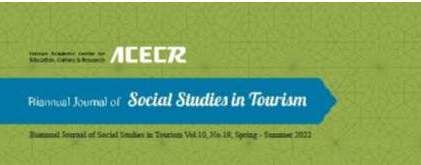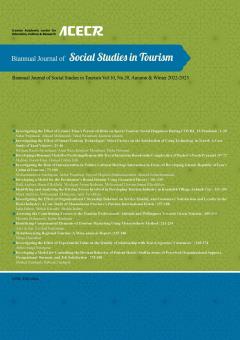Developing a Model for the Destination’s Brand Identity Using Grounded Theory
Subject Areas :
hadi asghari
1
,
Hamed Bakhshi
2
*
![]() ,
Mozghan Azimihashemi
3
,
Mohammad Hossein Imani khoshkho
4
,
Mozghan Azimihashemi
3
,
Mohammad Hossein Imani khoshkho
4
1 -
2 - پژوهشکده گردشگری جهاد دانشگاهی مشهد
3 -
4 -
Keywords: Brand identity, Destination Brand, Destination Brand identity, Grounded Theory,
Abstract :
Establishing a brand identity for tourism destinations may help ease the problems caused by the intangibility of tourism products and increase the concerted efforts of tourism service providers, ensuring stability in markets and facilitating the process of market segmentation. Therefore, considering the necessity for more attention to the destination’s brand identity due to increased competition within the tourism industry, this qualitative study sought to develop a model for establishing a brand identity for Mashhad city using the grounded theory method. To this end, some twelve managers, professors, and researchers working in the field of brand and tourism in Mashhad were selected to participate in detailed semi-structured interviews using purposive sampling. Then, the collected data were analyzed through open, axial, and selective coding. The study’s findings indicated the positive role of personal factors such as awareness of the destination’s brand or the tourists’ behavioral intentions in developing the brand identity of tourist destinations, which in turn influence the relevant strategies. In other words, such factors help the official select appropriate distinct marketing or development strategies, bringing about a variety of outcomes, including socio-economic development. Moreover, it could be argued that the strategies are set on the grounds of participation development in which the destination’s brand identity is formed. However, intervening factors such as micro and macro environmental factors should also be taken into account in this regard.
اسعدی، یعقوب ؛ عطائی ازدستانی، طیبه السادات ؛ شفیعی، زاهد(1394).«نقش هویت هنری مقصد در ایجاد برند شهری در ایران(مطالعه موردی شهر اصفهان)»،کنفرانس بین المللی توسعه با محوریت کشاورزی . محیط زیست و گردشگری.تبریز.
بهاري، جعفر؛ فراهاني، بنفشه؛ بهاري، شهلا؛ بذله، مرجان؛ بهاري، حامد. (1396). «ارزیابی ارزش ویژه برند در مقصد گردشگری از دیدگاه گردشگران داخلی (مطالعه موردی: شهر تبریز)». جغرافیایی فضای گردشگری.6(24 ). 73-100.
تقی زاده جورشری، محمدرضا؛ دل افروز، نرگس؛ شبگو منصف، محمود؛ باقرسلیمی، سعید. (1399). «برندسازی مقصد گردشگری با تأکید بر شناسایی ابعاد شخصیت برند مقصد برای استان گیلان». گردشگری و توسعه. 9(3). 219-234.
جلاليان ،سيداسحاق؛ سعيدي، مهدي؛ ويسيان، محمد (1398).« تحلیل ارزش ویژه ی برند مقصد گردشگری شهری (مطالعه ی موردی: شهر مریوان)». پژوهش های جغرافیای برنامه ریزی شهری. 7(2 ). 333-348.
علیزاده ،حمید؛ طیبی نیارکی، علیرضا؛ یکتا، حسن؛ رومیانی، سمیرا. (1398). «ارزیابی تاثیر هویت برند بر عملکرد از طریق نقش میانجی مدیریت ارتباط با مشتری». فصلنامه علمی تخصصی رویکردهای پژوهشی نوین در مدیریت و حسابداری. 3(13).209-217.
کیانی فیض آبادی، زهره. (1395). «شخصیت مقصد بر دلبستگی و رضایت گردشگران(مطالعه موردی: گردشگران داخلی شهر اصفهان)». فصلنامه برنامه ريزی و توسعه گردشگری.دورۀ 5. شمارۀ 16 .187-168.
محمدیان، محمود؛ نعمت پور، محمد؛ قربانی، سعید؛ سیدی، پیمان. (1398).« شخصیت برند مقصدگردشگری تهران و اعتماد به مقصد گردشگری: با نقش میانجی همخوانی خودپنداره گردشگر». مطالعات مدیریت گردشگری (مطالعات جهانگردی). 14(47 ). 65-96.
وثوقی، لیلا؛ عبدلی، مریم؛ خزایی، فاطمه؛ سارانی، مجید. (1399). «واکاوی ظرفیت برندسازی شهری و عناصر برند در مقصد گردشگری مبتنی بر رویکرد هویت مبنا». نشریه گردشگری شهری. 7(3).143-159.
Adeyinka-Ojo . S. (2020). Developing a Rural Tourism Destination Brand Framework from the Perspective of a Relationship-Based Approach [Online First], IntechOpen, DOI: 10.5772/intechopen.93839. Available from: https://www.intechopen.com/online-first/developing-a-rural-tourism-destination-brand-framework-from-the-
perspective-of-a-relationship-based- Baker, M. J. & Cameron, E. (2018). Critical success factors in destination marketing. Tourism & Hospitality Research. Vol, 8, No, 2. PP. 79-97.
Burmann, C. Hegner, S. & Riley, N. (2019). Towards an identity basedbranding. Marketing Theory, 9(1), 113-118. Caneen, J. M. (2014). Tourism and cultural identity: The case of Polynesian Cultural Center, Athens Journal of Tourism.Vol.1, No.2, pp.101-120.
Chang-Hua ,Y. Hsiu-Yu, T , Sue-Ting, C. (2020). Destination brand identity and emerging market tourists’ perceptions, Asia Pacific Journal of Tourism Research,25:12,1311-1328.
Chekalina, T. (2015). a value co-creation perspective on custumer-based equity modelling for tourism destination- a
case from Sweden .(PhD 's thesis), Mid Sweden University, Sweden. Chiang, L. Yang, C. S. (2018). Does country-of-origin brand personality generate retail cus tomer lifetime value? A Big Data analytics approach. Technological Forecas ting & Social Change, 130, 177-187. Hankinson, G. (2017). The management of destination brands: Five guiding principles based on recent developments in corporate branding theory.Journal of Brand Management. 14(3), 240-254 Kladou, s. & kehagias, j. (2014). Assessing destination brand equity: an integrated approach. Journal of destination
marketing. (3), 2-10. (DOI:10.1016/j.jdmm.2013.11.002) Merrilees, B., Miller, D. & Herington, C (2019). Antecedents of residents' city brand attitudes. Journal of Business
Research, 62, 362˚367. Pike, S. (2012). Destination positioning opportunities using personal values: Elicited through the Repertory Test with Laddering Analysis. Tourism Management. 33(1), 100 107.
Saraniemi,S. Komppula,R. (2019) .The development of a destination brand identity: a story of stakeholder collaboration.
Current Issues in Tourism. 22:9, 1116-1132. Tasci, A. D. Gartner, W. C. (2019). Chapter 11 A practical framework for destination branding. In L. A. Cai, W. C. Gartner, &
A. María Munar (Eds.),Tourism branding: Communities in action (pp. 149-158). Emerald Group Publishing Limited.
Zhang, L. Xiaobin, Z, S. (2019). City branding and the Olympic effect: A case study of Beijing. Cities, 26 , 245˚254.

